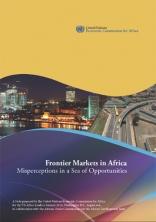Frontier Markets in Africa

The economic performance of Africa since the turn of the twenty-first century has been remarkable, even in the aftermath of the global financial and economic crisis. Growth has averaged 5 per cent per annum over the last decade, consistently outperforming global economic trends. Contrary to the notion that growth in Africa can be attributed to a boom in global demand for natural resources, the resources sector only contributed about a quarter to the impressive post-2000 economic expansion (McKinsey Global Institute, 2010). Underpinning the remaining three-quarters of the growth are improvements in governance and macroeconomic management, rapid urbanization and increasing domestic demand, increasing investment and trade ties with traditional and new partners, expanding regional markets and consistent, though slow, diversification of production and exports, which, in turn, spurred growth in, for example, the wholesale and retail, transportation and telecommunications, manufacturing and broader service sectors (McKinsey Global Institute, 2010; ECA and AUC, 2014). Indeed, the rapid growth occurred alongside a decline in conflicts, improved institutional and regulatory quality, and the emergence of increasingly accountable and democratic Governments (Ernst & Young, 2013).